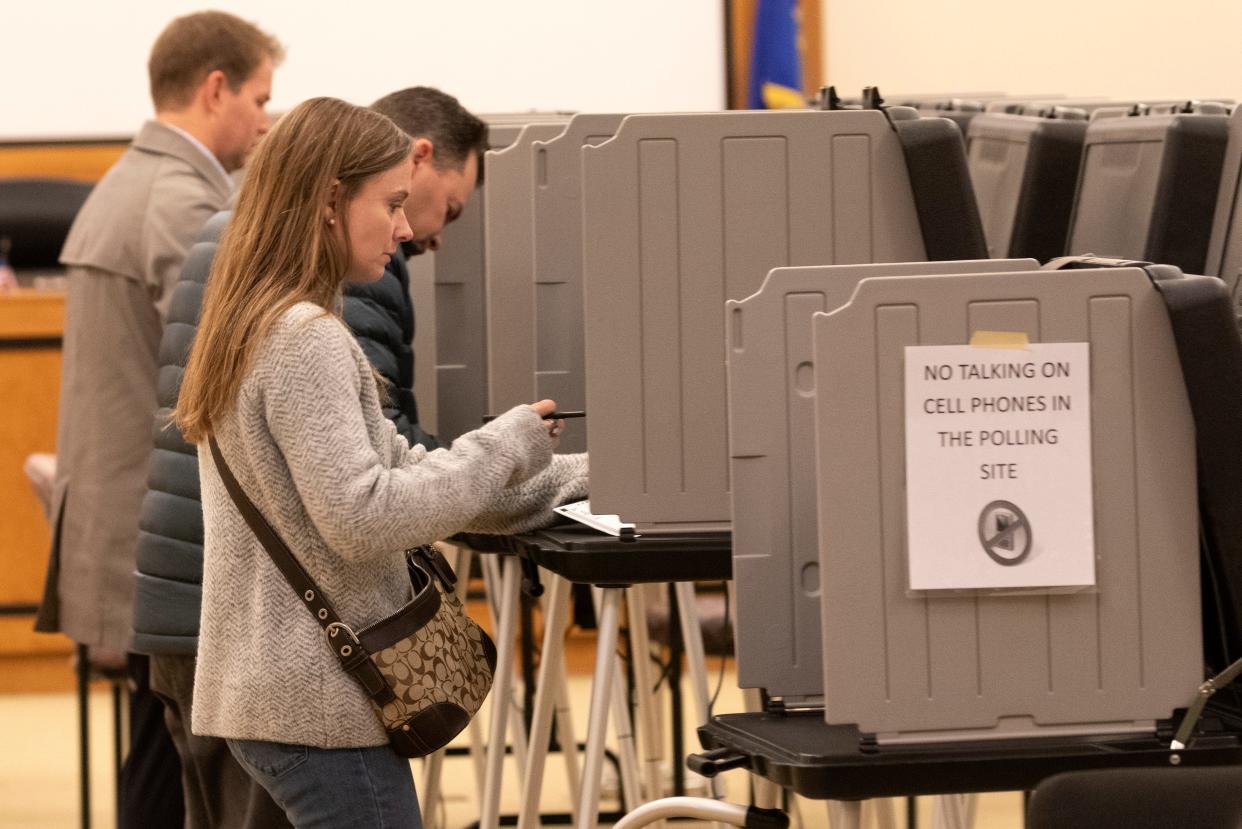Conservative group finds no signs of widespread voter fraud in Wisconsin but urges changes to election processes

MADISON – A conservative group issued a report Tuesday saying it found no evidence of widespread fraud in Wisconsin’s presidential election but believed officials did not closely follow all the state’s voting laws.
The report by the Wisconsin Institute for Law & Liberty provides Republicans with material they can use to argue Wisconsin’s elections system needs to be overhauled. But it also includes findings Democrats can seize on to emphasize that there is no credible evidence to question Joe Biden's victory over Donald Trump in Wisconsin.
Subscribe to our On Wisconsin Politics newsletter for the week's political news explained.
The report from the institute concluded there were no indications of widespread fraud and there was nothing suspicious about voter turnout or the timing of the vote tally. In addition, voting machines operated properly, the report found.
Despite those findings, the institute leveled numerous criticisms at how the election was conducted and contended changes need to be made for future contests.
The report comes as Republicans who control the Assembly conduct their own review of the election at a cost of $676,000 to taxpayers. Former state Supreme Court Justice Michael Gableman, who is overseeing that review, has focused on many of the same issues that WILL targeted in its report.
Riley Vetterkind, a spokesman for the Wisconsin Elections Commission, noted the state's results were verified by multiple authorities before they were finalized and were upheld by courts.
"Certification of the November 2020 presidential election was based upon lawfully cast votes that were affirmed by municipal, county and state canvass certifications and multiple court decisions after reviewing these matters," Vetterkind said by email.
Here’s a rundown of WILL's report’s findings and recommendations:
No signs of fraud
The report found "there was no evidence of widespread voter fraud" as the term is typically defined. However, WILL concluded fraud may be more difficult to identify because clerks around the state did not follow the same procedures.
WILL’s team examined about 20,000 ballots and found no signs the ballots were fraudulent or miscounted. In Milwaukee and elsewhere, there was not a mismatch between the number of people listed as voting and the ballots that were counted.
"Put simply, there was no unexplained 'ballot dump,'" the authors wrote.
Voting machines
"There is no evidence of significant problems with voting machines," the authors wrote.
There was nothing unusual about the results in communities that used Dominion Voting Systems machines, the report found. Trump and some other Republicans have fixated on the company’s machines, prompting the firm to sue conservative news outlets and Trump backers for defamation.
Drop boxes and voter rolls
The report contended election officials did not properly maintain the voting rolls and violated the law by setting up ballot drop boxes — claims election officials have disputed.
WILL this year lost a case before the state Supreme Court challenging the way the state maintained the voter rolls. WILL this summer brought a legal challenge to drop boxes and a Waukesha County judge will hold a hearing in that case next week.
Filling in addresses
The report criticized the state Elections Commission for telling clerks they could fill in incomplete addresses for witnesses on absentee ballot paperwork when voters forget to include their municipalities or ZIP codes. The policy was adopted in 2016 at the behest of Republicans.
Voting in nursing homes
The report argued election officials last year should have followed a state law that requires poll workers to visit nursing homes to assist them with voting. The Elections Commission told local officials to instead mail absentee ballots to residents because nursing homes were not accepting visitors during the COVID-19 pandemic.
Lawmakers and critics largely ignored the issue while it was happening but have recently attacked it as improper. The Racine County sheriff has argued five election commissioners should be charged with crimes — an idea WILL president Rick Esenberg opposes.
Election grants
Highlighting another issue that has frustrated Republicans, the report noted that the state’s five largest cities received $8.8 million in grants from the Center for Tech and Civic Life to help them run their elections. A far smaller amount — about $1.5 million — went to about 200 other communities, including some that lean Republican.
Courts have ruled the grants were allowed.
Recommendations
The report recommended hiring separate attorneys for Democratic and Republican members of the state Elections Commission; allowing lawmakers to sign off on guidance the commission sends to election clerks; requiring the commission to issue decisions within 60 days after it receives election complaints; establishing minimum security requirements for ballot drop boxes, such as video surveillance; banning or limiting private grants to help local governments run their elections; setting clear standards on when clerks can fix errors on ballot paperwork; and requiring all communities to set the same hours for early voting.
The authors also recommended allowing clerks to begin processing absentee ballots on the day before Election Day, which would make final results available much earlier on the night of the election.
The report also recommends making the state’s voter database available for free. The state charges $12,500 for the database.
Make your voice heard. Find and contact your representatives.
Contact Patrick Marley at [email protected]. Follow him on Twitter at @patrickdmarley.
Our subscribers make this reporting possible. Please consider supporting local journalism by subscribing to the Journal Sentinel at jsonline.com/deal.
DOWNLOAD THE APP: Get the latest news, sports and more
This article originally appeared on Milwaukee Journal Sentinel: Conservative group finds no signs of widespread Wisconsin voter fraud
